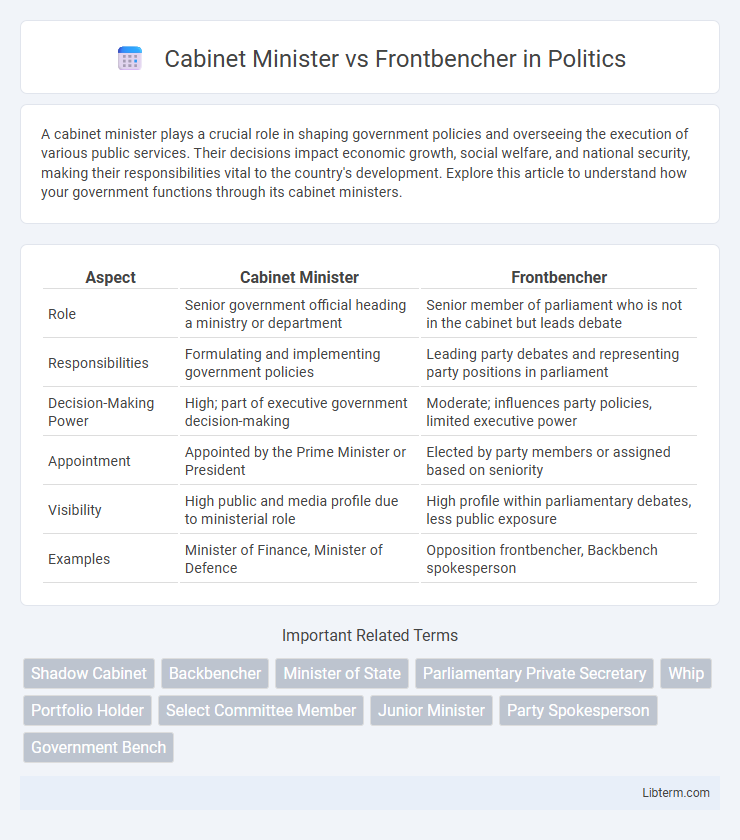A cabinet minister plays a crucial role in shaping government policies and overseeing the execution of various public services. Their decisions impact economic growth, social welfare, and national security, making their responsibilities vital to the country's development. Explore this article to understand how your government functions through its cabinet ministers.
Table of Comparison
| Aspect | Cabinet Minister | Frontbencher |
|---|---|---|
| Role | Senior government official heading a ministry or department | Senior member of parliament who is not in the cabinet but leads debate |
| Responsibilities | Formulating and implementing government policies | Leading party debates and representing party positions in parliament |
| Decision-Making Power | High; part of executive government decision-making | Moderate; influences party policies, limited executive power |
| Appointment | Appointed by the Prime Minister or President | Elected by party members or assigned based on seniority |
| Visibility | High public and media profile due to ministerial role | High profile within parliamentary debates, less public exposure |
| Examples | Minister of Finance, Minister of Defence | Opposition frontbencher, Backbench spokesperson |
Understanding Cabinet Ministers and Frontbenchers
Cabinet Ministers are senior government officials responsible for specific departments and shaping national policies, while Frontbenchers include both Cabinet Ministers and key opposition spokespeople who lead debates in parliament. Cabinet Ministers hold executive power and decision-making authority within the government, directing public administration and implementation of laws. Frontbenchers, whether government or opposition members, play crucial roles in legislative leadership and party strategy during parliamentary sessions.
Definition and Roles of Cabinet Ministers
Cabinet Ministers are senior members of the government responsible for specific departments or portfolios, making crucial policy decisions and executing government functions. Frontbenchers, while also prominent members of the legislature, may include both Cabinet Ministers and party spokespeople who lead debates but do not always hold executive authority. Cabinet Ministers shape national legislation, manage public services, and coordinate governmental strategies to implement the ruling party's agenda effectively.
Who Are Frontbenchers in Parliament?
Frontbenchers in Parliament are senior members of political parties who occupy prominent positions either as Cabinet Ministers or Shadow Cabinet members, playing key roles in policy-making and party strategy. They lead debates, represent government or opposition positions, and influence legislative agendas. Unlike backbenchers, frontbenchers have greater responsibilities and visibility within parliamentary proceedings.
Key Differences Between Cabinet Ministers and Frontbenchers
Cabinet Ministers hold executive authority within the government and are responsible for specific departments, implementing policies, and making high-level decisions, whereas Frontbenchers are members of parliament who occupy prominent seats in the legislative chamber without necessarily holding ministerial office. Cabinet Ministers are appointed by the Prime Minister and form the core decision-making team, while Frontbenchers include both government ministers and shadow ministers leading opposition roles. The primary difference lies in Cabinet Ministers' policy-making power and administrative responsibilities compared to Frontbenchers' roles in parliamentary debates and party leadership without executive responsibilities.
Appointment Process: Cabinet Minister vs Frontbencher
Cabinet Ministers are formally appointed by the head of state or government, typically following a nomination by the Prime Minister, reflecting their role in executive decision-making and policy implementation. Frontbenchers, while prominent members of their party and often part of the parliamentary leadership, do not undergo a formal appointment process and instead gain their positions through party selection or parliamentary recognition. This distinction highlights the Cabinet Ministers' official executive authority compared to Frontbenchers' primary function in legislative debate and party representation.
Powers and Responsibilities: A Comparative Overview
Cabinet Ministers hold executive authority, responsible for policymaking, departmental management, and implementation of government programs, wielding significant influence over national governance. Frontbenchers, including senior party members on the government's or opposition's front benches, focus on parliamentary debates, party strategy, and legislative scrutiny without direct administrative control. The primary distinction lies in Cabinet Ministers' executive powers versus Frontbenchers' roles in legislative leadership and party representation.
Influence on Government Policy and Legislation
Cabinet Ministers wield substantial influence over government policy and legislation by directly shaping decisions and implementing key government initiatives within their portfolios. Frontbenchers, while also holding prominent party positions, primarily influence policy through debate and advocacy rather than direct executive power. The cabinet's collective authority enables Cabinet Ministers to prioritize legislative agendas and direct government resources, whereas Frontbenchers contribute to shaping party strategy and public messaging.
Public Visibility and Media Presence
Cabinet Ministers typically command higher public visibility and extensive media presence due to their responsibility for major government departments and influence over policy decisions. Frontbenchers, while also prominent, receive less media attention unless they hold specific spokesperson roles or lead opposition critiques. Media coverage often highlights Cabinet Ministers during policy announcements and crisis management, reinforcing their status as key political figures.
Career Pathways: From Frontbencher to Cabinet Minister
A typical career pathway from frontbencher to cabinet minister involves gaining political experience and demonstrating leadership within the party and parliament. Frontbenchers, usually appointed as spokespersons or junior ministers, build their expertise by managing specific policy areas and showcasing their ability to influence legislation. Progression to cabinet minister occurs through proven competence, party loyalty, and strategic networking, leading to appointments in key government departments with significant executive responsibilities.
Importance in Parliamentary Democracy
Cabinet Ministers hold critical executive authority by formulating and implementing government policies, directly influencing national governance in a parliamentary democracy. Frontbenchers, whether in government or opposition, play strategic roles in shaping legislative debates and party agendas, impacting policy direction and public accountability. The prominence of Cabinet Ministers lies in their decision-making powers, while Frontbenchers contribute essential leadership within parliamentary functions, both pivotal for effective democratic governance.
Cabinet Minister Infographic

 libterm.com
libterm.com